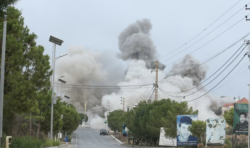Okinawa: Tokyo to overrule referendum on US base
- 2019-02-25 23:26:49


 Pierre Rayer: Art, Science, and Happiness: The Universal Mission of Transmission to Future Generations through Patronage at the Louvre Abu Dhabi
Pierre Rayer: Art, Science, and Happiness: The Universal Mission of Transmission to Future Generations through Patronage at the Louvre Abu Dhabi Ahly crowned Super champions after dramatic extra-time win over Modern Future FC
Ahly crowned Super champions after dramatic extra-time win over Modern Future FC Yemeni Honey..A Development Wealth Threatened By Conflict And Climate Change
Yemeni Honey..A Development Wealth Threatened By Conflict And Climate Change California wildfires: Millions warned of possible power cut
California wildfires: Millions warned of possible power cut Central African rebels launch attacks near capital
Central African rebels launch attacks near capital French Interior Minister Condemns Incident Involving Israeli Orchestra in Paris
French Interior Minister Condemns Incident Involving Israeli Orchestra in Paris US forces working with Israel on Gaza aid, Israeli official says
US forces working with Israel on Gaza aid, Israeli official says He stole and dozed off... caught a thief sleeping in the victim's house
He stole and dozed off... caught a thief sleeping in the victim's house UN Report: Yemen Conflict Deepens Amid Houthi Escalation and Regional Tensions
UN Report: Yemen Conflict Deepens Amid Houthi Escalation and Regional Tensions Israel carries out attacks in southern Lebanon
Israel carries out attacks in southern Lebanon
